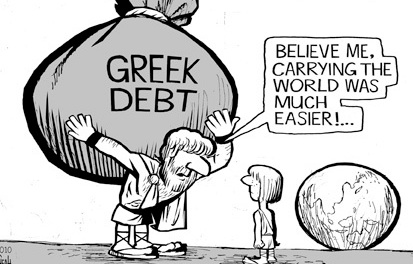Yanis Varoufakis writes: Three months of negotiations between the Greek government and our European and international partners have brought about much convergence on the steps needed to overcome years of economic crisis and to bring about sustained recovery in Greece. But they have not yet produced a deal. Why? What steps are needed to produce a viable, mutually agreed reform agenda?
We and our partners already agree on much. Greece’s tax system needs to be revamped, and the revenue authorities must be freed from political and corporate influence. The pension system is ailing. The economy’s credit circuits are broken. The labor market has been devastated by the crisis and is deeply segmented, with productivity growth stalled. Public administration is in urgent need of modernization, and public resources must be used more efficiently. Overwhelming obstacles block the formation of new companies. Competition in product markets is far too circumscribed. And inequality has reached outrageous levels, preventing society from uniting behind essential reforms.
Beginning with fiscal consolidation, the issue at hand concerns the method. The “troika” institutions (the European Commission, the European Central Bank, and the International Monetary Fund) have, over the years, placed Greece in an austerity trap.
When fiscal consolidation turns on a predetermined debt ratio to be achieved at a predetermined point in the future, the primary surpluses needed to hit those targets are such that the effect on the private sector undermines the assumed growth rates and thus derails the planned fiscal path. Indeed, this is precisely why previous fiscal-consolidation plans for Greece missed their targets so spectacularly.
Our government’s position is that backward induction should be ditched. If this means that the debt-to-GDP ratio will be higher than 120% in 2020, we devise smart ways to rationalize, re-profile, or restructure the debt – keeping in mind the aim of maximizing the effective present value that will be returned to Greece’s creditors.
Besides convincing the troika that our debt sustainability analysis should avoid the austerity trap, we must overcome the second hurdle: the “reform trap.” The previous reform program was founded on internal devaluation, wage and pension cuts, loss of labor protections, and price-maximizing privatization of public assets.
Our government believes that this program has failed, leaving the population weary of reform. The best evidence of this failure is that, despite a huge drop in wages and costs, export growth has been flat.
Additional wage cuts will not help export-oriented companies, which are mired in a credit crunch. And further cuts in pensions will not address the true causes of the pension system’s troubles (low employment and vast undeclared labor). Such measures will merely cause further damage to Greece’s already-stressed social fabric, rendering it incapable of providing the support that our reform agenda desperately needs.
The current disagreements with our partners are not unbridgeable. Our government is eager to rationalize the pension system (for example, by limiting early retirement), proceed with partial privatization of public assets, address the non-performing loans that are clogging the economy’s credit circuits, create a fully independent tax commission, and boost entrepreneurship. The differences that remain concern how we understand the relationships between the various reforms and the macro environment.
None of this means that common ground cannot be achieved immediately.

